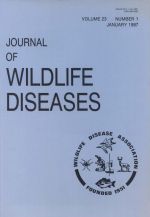Agglutinins to Leptospira were found at titers of ≥1:100 in 150 of 501 (29.9%) vervet monkeys (Cercopithecus aethiops sabaeus) bled within 1 mo of capture in Barbados. Including a further 34 of 145 bled within 1 yr of capture, the seropositivity prevalence was 28.5%. A further 35 monkeys (5.4%) had traces of agglutinins or gave titers of 1:50. The proportion of seropositive adults (41.5%) was more than twice that of seropositive immature monkeys (17.6%). Among adults, 49.2% of males and 35.7% of females were seropositive, while among juveniles proportions of seropositive males and females were similar (17.8% and 17.4%, respectively). Seropositivity prevalences tended to increase in proportion to rainfall. In each of 165 of the 184 positive sera, a single serogroup predominated in the serological reactions. These serogroups were Ballum (61%), Icterohaemorrhagiae (16%), Autumnalis (15%), Pyrogenes, Panama, Pomona, Tarassovi and Canicola (8% altogether). In the other 19 positive sera no single serogroup predominated. Serial bleeding showed that vervet monkeys can retain naturally acquired antibodies to Leptospira for at least 2.5 yr. The evidence suggests that vervet monkeys in Barbados are transmitting leptospiral infections among themselves independently of other groups of animals, and are not a major source of human leptospirosis.
How to translate text using browser tools
1 January 1987
LEPTOSPIRES IN VERVET MONKEYS (CERCOPITHECUS AETHIOPS SABAEUS) ON BARBADOS
J. Baulu,
C. O. R. Everard,
J. D. Everard





